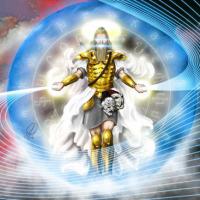RUMINATIONS IN THE TOWER
by Sulis Nithryon
"The arbitrary and the motivated in regarding one's divine ancestors: ignoring a manifest concern for belief in them as us, instead we concern ourselves with intensity and its relationship with action, valorizing ‘little narratives’ and proliferation of narratives in our native cultures to the point that there is no perch from extraneous content. Pure subjectivity is no longer possible; instead it becomes akin to sensory deprivation, yet without the fear, for we sense things that remind us of the dawn: the sacrifice into the stabilizing bones, new-built towers with broken intentions, and first metals gone blue from exposure to the long sun. The quest toward the ur-you for certainty and foundations is not innocent. However, it is an honest vindication for truth and superhuman ideals, which means it should be regarded as such by our own sense of fault: we made this, we dreamed this, we made it viable by voting with our seductions, we will live again to show our genuine applause." ~ Obscure Text, On Aldmeri Ancestor Worship
4E 202
I, Sulis Nithryon, of the House of Nithryon of Balmora, stress to you, dear reader, the probable heretical nature of this short treatise; for it is of a nature most grievous to Nord sentimentality. Amidst much of the awe and spectacle this Ysmir of the North has produced amongst the superstitious Nord race, there is indeed a sliver of false hope in their prophecy of this 'World Eater.' It is a fantasy of dragon proportions; a manifest poison that seeps for long ages in the frost-bitten veins of Nordic bloodlust.
These barbarians {for I speak of such an outwardly excessive people driven to primitive bush-life} live with no original conviction of their own about the inward nature of Man, Mer, or Beast. They are compelled, instead, by their fleshly desires to consume. These are the descendants of Ysgramor, one by whom they declare legitimate to kneel before a Dead God, whilst proclaiming the existence of a utopian externality called 'Sovngarde.' Their is an illogic here which the Dwemereth lords would have deemed blasphemous, yea, tragic.
It is from the ashes of Lorkhan that indeed a Dovahkhiin would exist, let alone a great rival called Alduin. The dragon is a creation, not of the Heart of the God, but of fire and ash. Rather than let the ashes blow to the east wind of Vvardenfell, the northern mist itself mixes with the ash-smoke and creates a haze of illusion. It is, dear reader, a mere symbol of Nord propaganda. If there is an afterlife in the Aurbis, it is rather mirrored within your own soul, and is therefore a Tower and a Presence for all races at all times.
For the most astute among the ancient Aldmer had long realized that Men are foolish beyond their days, and often get consumed in their own stories, which, in part are weaved for entertainment, or for political polemics. This is the World-Eater in all his glory. It is a prejudice rooted in Altmer soil, long ere the sons of god were begotten. Gods to Men are brilliant imposters of the Eternal Throne. Gods to Men, unbeknownst to them, are epochal beings, not quite alive. Since the Now eludes them, they are forever divided. Sometimes nothing blinds souls more profoundly than the apprehension of the Whole. Men need recall this when they pray to the 'Divines.'
It has been error against error, for thousands of years since the advent of the First Dragonborn, whom many call Miraak. He was false, as ever there is, compelled by the Demon of Knowledge that the secret to immortality is the apprehension of the vicious Wheel of Aurbis. An illusion so beautiful, so seductive as is the nature of Dibella, that immortality became the very definition of undying thirst in time. Such is the suffering of Lorkhan. That demons might array in his splendid Light and usurp his empty throne; not because he is Dead, like the Nords assert, but that he has indeed died to live again; failing Mundus, failing in all his power, failing to be a hero, a savior of Men, Mer and Beasts. Failing so that all of Nirn might fail to create a Utopian Decay. Failing that we might succeed to preserve an Ordinary Life.
It is in these Tower walls, mirrored in the external plane from Aetherius, that we might strive to remain as stillness within a Bastion of Light that absorbs consumption, decay and fear itself. But it is not a strong Tower. It is very weak and always crumbling. Lorkhan's Tower must be so, such was his love for all of the dead and rising gods.
It is at this historical juncture that Nords once again, according to the grace of Lorkhan, are rising up to consume, now in the Age of Error. A new False Dragonborn now sits on the throne of Lorkhan; a willing agent of the Name, and a willing soul to usher in a new covenant, imparted now also to the Nord race. But the hero will wield a double-edged sword which will smite the Dunmer and consume them in religious fervor. This will appear to incite lasting change for the better among the Nords of Skyrim; but as the fruit of the ash plant yields crop, the land will remain barren with the ash; a testament to the seductive fruit of the Ashlanders as it is to the seductive prophecies of the Nords.
In the interim, however, much more can be said about the innate nature of the soul and the inherent cycle of suffering inherent in Mundus. The meditator only knows to enter the Tower through the narrow gate, for in the darkness is it ever found from the light shining forth in the side window.
Blessed be Lorkhan! And may the Psijic Endeavor prosper evermore.

